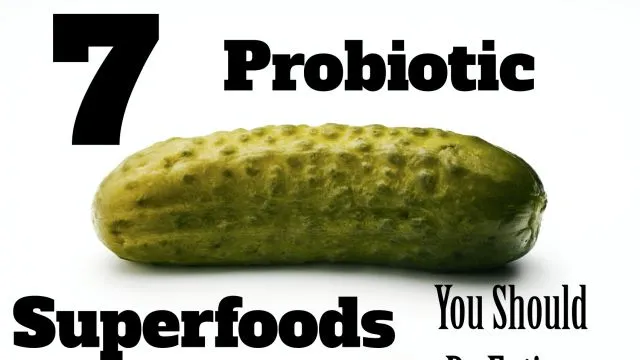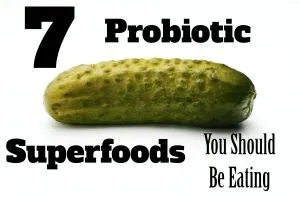
- Share on Facebook1677
- Share on Pinterest
- Share on Twitter
Probiotics are no fad. Having ‘good’ bacteria in the gut is linked to a stronger immune system, better digestion, and less inflammation, among many, many other health benefits.
Probiotics support a healthy gut and a healthy weight
Probiotics are live organisms that provide food for healthy gut bacteria. These bacteria fight off unhealthy bacteria in the system. As a result, probiotics create a supportive environment for a healthy immune system, optimal intestinal function and many other bodily systems.
Here is some really great news about probiotics:
They also prevent fat calories from being absorbed through the intestines and destroy bile salts, which are produced by the liver and help the intestines digest fat. By destroying bile salts, fat absorption is blocked and fat is eliminated in waste.
While eating probiotics alone may not become a singular approach for weight loss, it may become one of the recommendations doctors make to patients. Combined with physical activity and a balanced healthy diet, probiotics can be an important factor.
Although yogurt and probiotic capsules are probably the most popular forms, there are many other foods that also naturally provide the friendly bacteria that you need to stay healthy.
Here are 7 probiotic foods you should be eating:
1. Sauerkraut
Made from fermented cabbage and other vegetables, sauerkraut contains healthy live cultures along with vitamins B, A, E and C. It’s also great for your gut! In fact, it was originally created both to preserve food and to treat stomach-related illnesses.
You can make your own or purchase an organic, pure variety at the store, but make sure you stay away from the canned variety. Canned sauerkraut has been pasteurized, and therefore will not provide the same benefits.
2. Kefir
This tangy dairy beverage contains many different strains of probiotic bacteria, along with 11 grams of protein per cup. And it has many other health benefits, which we’ve written about before. Even better, you can make this one yourself by purchasing kefir grains online or at your local health food store!
Add it to a smoothie, eat it with oatmeal, or enjoy it by itself with a few drops of honey.
3. Pickles
Yes! That yummy sandwich topper can also be a potent source of probiotics. Look for pickles (or make your own) that are fermented, rather than those brined with vinegar, as fermented varieties contain the most beneficial bacteria. Also look for pickles without artificial colors, chemicals, or sugar.
4. Greek yogurt
Yogurt, as we mentioned earlier, is one of the most popular and affordable probiotic sources out there. Although kefir may contain more beneficial bacterial strains than yogurt, yogurt (quite frankly) tastes better to many people. Check that your yogurt is organic and that it contains only two ingredients: milk and live yogurt cultures, or better yet, make your own!
5. Kimchi
Sauerkraut’s Korean sister, kimchi, is known for being both probiotic and nutrient-dense. Along with the healthy bacterial benefits, traditional Asian kimchi also usually contains healthy spices like garlic and ginger, and other vegetables like scallions, which add to its health benefits in a big way.
Just make sure you get a pure variety made with whole ingredients, and no additives.
6. Miso
 This salty and tangy paste is a traditional Japanese seasoning made by fermenting soybeans with salt and kojikin—a fungus. You can add it to any soup or stew, but it’s usually used as part of traditional Japanese miso soup.
This salty and tangy paste is a traditional Japanese seasoning made by fermenting soybeans with salt and kojikin—a fungus. You can add it to any soup or stew, but it’s usually used as part of traditional Japanese miso soup.
Look for it in the refrigerated section of your grocery or health food store store – just make sure it’s high quality and contains no additives.
7. Kombucha
Kombucha is a fermented Chinese tea that has been drunk for centuries across this East Asian country. Traditionally, it’s believed to aid in weight loss, as well as to increase energy levels and overall feelings of wellbeing. The tea is brewed by fermenting sweetened black tea with yeast and bacteria.
You can find it in the refrigerated section of most grocery stores (organic is always best) or you can pick up a kombucha kit and brew it yourself at home!
Many of these foods can pack a powerful digestive punch, so be sure to incorporate them into your diet slowly and safely, and speak to a health professional before you make any big changes.
If you are fermenting food yourself, be sure you are doing so safely. If you have any questions about what can be fermented and how to do it safely, a good source is The Art of Fermentation by Sandor Katz.
What’s your favorite way to get your daily dose of probiotics?
-The Alternative Daily
Sources:
http://www.livestrong.com/slideshow/1010455-13-surprising-beneficial-probiotic-foods/#slide=11
http://www.womenshealthmag.com/nutrition/foods-high-in-probiotics
https://www.thealternativedaily.com/top-5-superfoods-healthy-gut-bacteria
- Share on Facebook1677
- Share on Pinterest
- Share on Twitter

